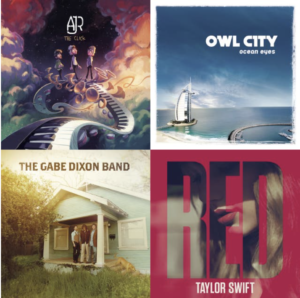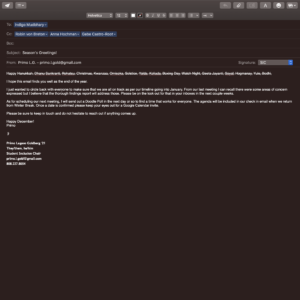Global warming is a central concern that many feel must be addressed immediately. The pressing nature of climate change is the central work and mission of the LWHS Environmental Club, currently led by Amelia Fortgang ’22, Erika Tam ’22, Hannah Merickel ’22, Kyan Shlipak ’22 and Teresa Topete ’21.
“We continue trying to be more action-based rather than education-based since people already know a lot about this issue,” said Fortgang.
As with other clubs on campus, COVID-19 has made the work of the Environmental Club more difficult to accomplish. “[COVID-19] paused a lot of the climate activism that was happening pre-pandemic,” said Tam. Though activism has now regained more traction, keeping club members engaged is a constant challenge.
“We’ve had to find ways to do digital actions that are still just as impactful,” said Fortgang.
To increase the level of members’ engagement, the Environmental Club leaders have aimed to introduce more captivating and relevant projects into club meetings and initiatives.
Much of their work this year has revolved around the presidential election and the consequences of the pandemic. The club worked with an environmental club leader at the Ruth Asawa San Francisco School of The Arts to call voters in the key battleground state of Pennsylvania, advocating for people to consider the impact of climate change and vote for a political candidate who would properly address it rather than denying it.
Right now, the LWHS Environmental Club, in collaboration with a group called the Compton Kidz Club and the Urban School of San Francisco, San Domenico School, and St. Ignatius College Preparatory, is focusing its efforts on a Community Fridge, which is a mutual aid project that allows for items to be shared within communities. The aim of the Environmental Club’s Community Fridge Project is to donate clothing and hygiene kits in the time of COVID when people are stuck at home and unable to access these essentials.
“We also wanted to encourage students and families to assess what they have and are able to donate and share. For the hygiene supplies, we reached out to several sustainable brands which have donated deodorant, toothpaste, feminine hygiene supplies and masks,” said Tam.
There is a clothing donation box on campus in front of the Center for Civic Engagement.
This project grew out of several concerns. One was to support those who need clothes and hygiene supplies to stay safe and healthy. An added bonus was to bring awareness of the need to share and repurpose clothing and to consider the impact of constant consumerism — as represented by fast fashion industries. Companies like Urban Outfitters, Forever 21, Zara and H&M quickly translate trending, sought-after designs from runway collections into mass-produced cheap versions for popular consumption. They encourage rapid turnover in individuals’ wardrobes and addictive shopping habits. 13 billion tons of unsold and discarded clothing go into landfills each year.
“Fast fashion is one of the top polluting industries, so we wanted to combat this by donating second-hand winter clothing as the weather gets colder,” said Fortgang. “Some community fridges receive donations of hygiene kits already, but they are most often not environmentally friendly.” By reaching out to sustainable companies such as Allbirds and Harvest & Mill, the club could provide for underserved communities in a conscious way.
Other initiatives the club has worked on this year include organizing a Youth Climate Summit to inspire solutions to environmental problems, an email storm meeting to advocate for the protection of Canadian Indigenous land defenders and a climate camp for young students to learn more about the environment.
As the year comes to an end, the club leaders are setting some new goals for what they aim to accomplish next semester. “We’re organizing a few climate action plans at Lick,” said Tam. “We wanted to do something related to food waste in the Caf before the pandemic, but now we’re not in person.” New ideas for these climate action plans include an online clothing swap or plastic-free challenge.
“I also definitely would like to see our club partner with other San Francisco high schools’ environmental clubs,” said Tam. “As Lick’s Environmental Club presence grows on campus, collaborating with [other] schools would be really interesting. Especially now, during the pandemic, it’s super easy to do virtual gatherings and make it a collective San Francisco high school effort.”
Beyond the actions that club members can take as a part of the Environmental Club, there are individual actions that the Lick community can undertake to lessen their environmental impact and make a positive change.
“The top suggestion I would have is to vote — that is so important,” said Fortgang. “While climate change and science should never have been a political issue, they have become one now, so we really have to use voting and being politically active as a tool to solve climate change…above all, systemic change for this issue is more important than using a reusable straw.”
Tam agrees: “You want to learn how you can get involved with organizations and corporations who are at the forefront of the environmental movement already.”
Aside from voting and being politically active, ways to lessen one’s personal environmental impact include walking when possible, limiting consumption of meat, being observant of excessive purchases and buying environmentally friendly products. However, Tam does note that “having the access to environmentally friendly products is definitely a financial privilege.”
“This [moment in time] is really one of our last shots to not only save our planet but all the people who live on it. In the Bay Area, we have a fire season now. We didn’t have that when we were younger. And when we wake up and see the sky is orange, it’s really scary. I think it’s important that we start taking action where we can as high schoolers,” said Fortgang.






